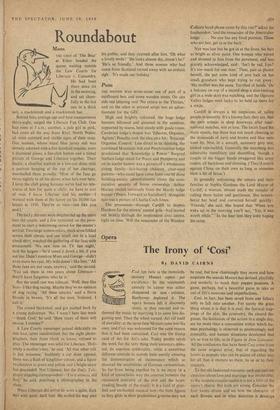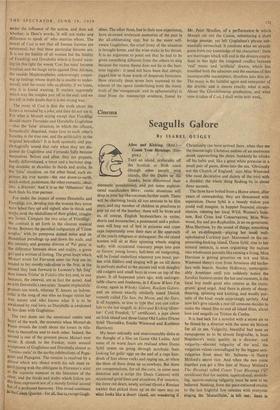Opera
The Irony of 'Cosi'
CAIRNS By DAVID
Cos) fan nate is the twentieth- centtiry Mozart opera par excellence. In the nineteenth century its career was either chequered or non - existent.. Beethoven deplored it. The opera houses left it discreetly alone, or they rescued and re- deemed the music by marrying it to some less dis- gusting text. Then the wheel turned. Art rid itself of morality; at the same time Mozart came into his own; and Cosi was welcomed for the same reason that it had been ostracised. Cos) was the trump Card of Art for Art's sake. Today people relish the work for the very thing their ancestors detes- ted, its supreme artificiality, while a somewhat different attitude to morals finds merely amusing the demonstration of inconstancy which so . shocked the sensibilities of German romanticism. So far from being repelled by it we enjoy in a kind of masochistic way the contrast between the mannered unreality of the plot and the heart- rending beauty of the music: it is a kind of glori- fied and enchanted musical box; the little figures as they glide in their predestined grooves may not
be real, but how charmingly they move and how exquisite the sounds Mozart has devised, playfully and tenderly, to mock their puppet passions. A game, perhaps, but a beautiful game to take us out of life's neuroses and imperfections.
Cosi, in fact, has been saved from one fallacy only to fall into another. For surely the great thing about it is that it is real; the farcical trap- pings of the plot, the symMetry, the absurd dis- guises, the limitation of the action to a single day, are no more than a convention within which hu- Man psychOlogy is observed as penetratingly and ironically, and human situations developed that are as true to life, as in Figaro or Don Giovanni. All the confusions that have beset Cosi conic from the same original error, that of regarding the lovers as puppets who can be paired off either way for all that it matters to them, to us or to their creators.
To the old-fashioned romantic such out and out cynicism about love and marriage was intolerable; to the modern escapist-realist it is not a little of the opera's charm. But both arc wrong. Consider the four lovers afresh and see how the character of each flowers and in what direction it develops under the influence of the action, and then ask whether, in Dent's words, 'it will not make any difference to speak of who marries whom. The
moral of Cosi is not that all human liaisons are ephemeral, but that these particular liaisons are. It is not the fidelity of all women but the fidelity
of Fiordiligi and Dorabella which is found want- ing (in this light the words 'Cosi fan tutte' become , ironical, and the laugh turns against Don Alfonso, the seaside Mephistopheles, unknowingly conjur- ing up feelings whose depth he is unable to under- stand); and the music tells us plainly, if we listen, why it is found wanting. It matters supremely which way the couples pair off in the end; and we are left in little doubt that it is the wrong way.
The irony of Cosi is that the truth about the lovers is revealed' by a joke, and they do not see it.
For what is Mozart saying except that Fiordiligi should marry Ferrando and Dorabella Guglielmo —that the 'false' situation, in which the officers,.
fantastically disguised, make love to each other's fiancées, is the true one, and the artificiality in the original betrothals? It is both symbolic and psy- chologically sound that only when they are dis- guised do Guglielmo and Ferrando fully become themselves. Before and after, they are puppets, hardly differentiated, a tenor and a baritone sing- ing shoulder to shoulder in thirds and sixths. In the 'false' situation, on the other hand, each ex-
presses his true nature—the one down-to-earth, quick-witted, passionate, the other romantic, ideal- - istic, a dreamer: And it is as the 'Albanians' that each finds his true partner. 1 For under the impact of events Dorabella and 1 Fiordiligi, too, develop.into the women they never ' were 4when they sat arid sighed, also in thirds and sixths, over the medallions of their gilded, imagin- ary lovers. Compare the two arias of Fiordiligi:
the contrast is set forth in the clearest musical terms. Between the parodied indignation of 'Come scoglio,' with 'its pompous dotted notes and its Handelian paradings up and down the scale, and the intensity and genuine distress of 'Per pieta' is the difference between sham and reality, a green girl and a woman of feeling. The great leaps which Mozart wrote for Ferraresi seem (as they are in- tended to be) merely ridiculous in the first; in the
second they look forward to Leonore's Ich folg' dem innern Triebe' in Fidelio (the key and, in one
instance, the interval, are in fact the same). And
. ao with Dorabella's two arias: 'Smanie implacabile' protests too much, whereas `E Amore un ladron-
cello' is the song of one who no longer resists her true nature and who knows what it is to be awakened by real love, as Dorabella is awakened in her duet with Guglielmo.
The two duets are the emotional centre and heart of the work, the moments when Mozart-da Ponte reveals the truth about the lovers in rela- tion to themselves and to each other. Indeed, the Second is one of the greatest pieces Mozart ever
wrote. It stands to the franker, more sensual acceptance of Guglielmo and Dorabella almost as ITamino mein' to the earthy celebrations of Papa- geno and Papagena. The tension is resolved by a Phrase which any oboist worth his salt must re- gard (along with the obbligato in Florestan's aria) as the supreme moment in the literature of the oboe; and the thirds and sixths which follow are this time expressive not.of a merely formal accord but of a profound harmony. This mood continues an the Canon Quartet—for all, that is, except Gugli-
elmo. The other three, lost in their new experience, have drowned irrelevant memories of the past in the all-obliterating cup; but to the more self- aware Guglielmo, the cruel irony of the situation is brought home, and the wine sticks in his throat. It is no argument to point out that he had to be given something different from the others to sing because the canon theme does not lie in the bari- tone register: it need not have been that abrupt, jagged line or those words of desperate bitterness. How crucially these seven bars mattered to the scheme of the opera (underlining both the ironic truth of the 'masquerade' and its ephemerality) is clear from the manuscript evidence, found by
Mr. Peter Stradlen, of a performance In which Mozart cut out the Canon, substituting a short bridge passage, yet left Guglielmo's phrase sub- stantially untouched. It confirms what we already guess from our knowledge of the characters: these are marriages which will end in the divorce courts. Seen in this light the imagined conflict between `real' music and 'artificial' drama, which has troubled both the admirers and the enemies of this incomparable masterpiece, dissolves into thin air. The music is the faithful agent and interpreter of the drama; and it means exactly what it says. About the Glyndebourne production, and what view it takes of Cosi, 1 shall write next week,







































 Previous page
Previous page